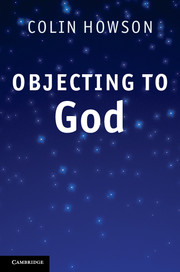Book contents
- Frontmatter
- Contents
- Preface
- Acknowledgments
- Chapter 1 Of human bondage
- Chapter 2 God unlimited
- Chapter 3 How to reason if you must
- Chapter 4 The well-tempered universe
- Chapter 5 What does it all mean?
- Chapter 6 Moral equilibrium
- Chapter 7 What is life without Thee?
- Chapter 8 It necessarily ain't so
- Bibliography
- Index
- References
Chapter 3 - How to reason if you must
Published online by Cambridge University Press: 05 June 2012
- Frontmatter
- Contents
- Preface
- Acknowledgments
- Chapter 1 Of human bondage
- Chapter 2 God unlimited
- Chapter 3 How to reason if you must
- Chapter 4 The well-tempered universe
- Chapter 5 What does it all mean?
- Chapter 6 Moral equilibrium
- Chapter 7 What is life without Thee?
- Chapter 8 It necessarily ain't so
- Bibliography
- Index
- References
Summary
‘There are lies, damned lies, and statistics.’
Infinity-nothing
In this chapter we shall be developing the logical tools – very minimal tools which require no special expertise to use – for evaluating a type of argument – probabilistic – which has always been a feature of the discussion of the evidence for, or against, God's existence. We shall start by looking at one of the most famous, and still widely employed, due to one of the great pioneers of the modern theory of probability, the mathematician and Christian mystic Blaise Pascal. His argument is actually a prudential argument less for belief as such than for acting as if you believed, but as he pointed out, a long enough period of habituation to a life of apparent devotion will very likely lead to the devotion becoming more than just apparent. ‘Appetite comes with eating’, says the French proverb.
- Type
- Chapter
- Information
- Objecting to God , pp. 64 - 90Publisher: Cambridge University PressPrint publication year: 2011



